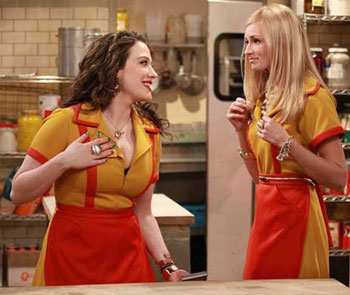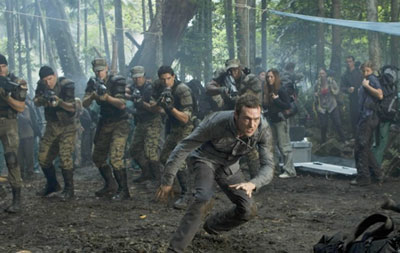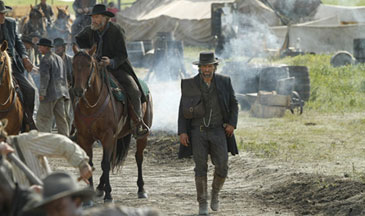Since the early 50s, television has mirrored the American culture, often through a foggy lens. The golden age of television gave us Lucy and Desi, Ralph and Alice, all working their way towards the American Dream, while the 60s hid social messages in sci-fi episodes (the morality plays hidden in The Twilight Zone, the first interracial kiss in network TV history on Star Trek). The seventies saw a clash of generations between Meathead and Archie every week on All in the Family, punctuated by the irreverent humor of Saturday Night Live.
A major shift occurred in the 80s. Middle class families were no longer living in small rented apartments like Lucy and Desi. They were rich like the Cosby's who were struggling to keep their family values in spite of their affluence. We saw self-indulgent boomers (Thirtysomething) and aging hippie parents trying to cope with the politics of their young republican son (Family Ties). By the 90s the age of narcissism delivered young affluent singles making their way through the world (Friends, Sex in the City), while the more somber 2000s focused on national security and terrorism (24, Alias) in a post 9/11 world.
Now as a new decade begins, this season’s TV line-up shows a damaged society, almost as dysfunctional as Congress, filled with broken families, financial anxiety, emasculated stay-at-home men, and class warfare. Certainly, with all the challenges the country is facing today – a government debt crisis, towering unemployment, a toxic political stalemate – art may actually be imitating life.
Young and Underemployed
Gone are the days of Ross and Rachel slurping down $4 lattes in New York’s Greenwich Village while working nebulous jobs and going home to improbably spacious downtown lofts. In CBS’s 2 Broke Girls, the characters must now schlep out to Brooklyn and work service jobs to pay the chance to live in the Big Apple (a situation that rings true for most young New Yorkers). Kat Dennings (The 40 Year Old Virgin, Thor) and Beth Behrs play the struggling urbanites slaving away at a neighborhood dinner as they try to save enough to open their own business, but find that life keeps getting in the way. Entrepreneurship, it seems, is the only way to make it out of the recession.
There’s More to Life Than Your Career
In HBO’s Enlightened, David Lynch’s muse Laura Dern (one of many actors who have jumped ship to the small screen) plays a high powered exec working for a massive global conglomerate who suffers a breakdown and realizes there are more important things in life than her career and money. Though this plot is at least as old as Ebenezer Scrooge, it is getting a lot of play in the age of the Great Recession where Wall Street execs give up their fat bonuses and reevaluate the meaning of life. New shows such as Stars’ Boss, The CW’s Hart of Dixie, and CBS’ A Gifted Man all offering variations of the “life isn’t all about work” theme.
The Man Crisis
The so-called “Mancession” is getting a fair share of play this season. Previous sitcoms have focused on schlubby men married to improbably attractive stay-at-home moms who shook their heads in exasperation at their husband’s lunkhead ways. The new model is to have the schlubby man shake his head in exasperation at an increasingly feminized world. ABC gives us a double dose of this dynamic with Last Man Standing and Man Up, while CBS’s How To Be A Gentlemen features a metrosexual magazine editor who is taught to grunt and sweat like the rest of us. But ABC takes the (beef) cake by combining the employment crisis with the crisis of masculinity in Work It. Taking a page out of early 80’s Tom Hanks in Bosom Buddies, the show features two out of work car salesmen who dress as women to snag jobs as pharmaceutical reps.
Finding Comfort in the Past
Retreating to “better times” of the past is a standard strategy for Hollywood (there’s a reason the comforting family fare of Happy Days, The Waltons and Little House on the Praire were such big hits during the aftermath of the sexual revolution). Several shows this season look backwards with ABC’s Pan Am longing for the days when you could simply walk onto a plane (without removing your shoes), light up a cigarette, and hit on a stewardess without fear; and NBC’s The Playboy club longs for the days when objectifying women was nothing to be ashamed of. Both take a page from AMC’s runaway success Mad Men.

Escaping to a Fantasy
Living in hard times means turning to entertainment for escape. NBC’s Grimm and ABC’s Once Upon A Time retreat into the world of fairy tales…but Fox’s Terra Nova sends its characters back in time to an age when life was simpler…the age of the dinosaurs. After the earth is rendered uninhabitable by our excesses, the protagonist must go back to a time before man corrupted the planet…presumably so they can start corrupting it even earlier.
History Always Repeats Itself
AMC’s Hell on Wheels also looks backwards, but less for comfort and more to see how we got into this mess to begin with. The series focuses on the building of the transcontinental railroad, a time when a large corporation uses its power to serve its own interests. Meanwhile, the working populace, rattled by a rapidly changing social dynamic in the wake of The Civil War, is motivated by fear, greed, racism and religion to create a growing schism between the two groups…we are talking about the 1870’s, right?
Class Warfare 
In ABC’s Revenge, a young person seeking vengeance on the community that wronged her family implicitly ties this story to class warfare, setting the plot among wealthy socialites in the insular world of the Hamptons. We may not see any of the perpetrators of the financial scandals behind bars, but ABC is hoping that viewers will settle for a fictional dose of schadenfreude as the comely heroine brings down the heartless blue bloods.
More Money, More Problems
If Revenge hopes that viewers will tune into watch the wealthy get their just desserts, CW’s Ringer plays the “grass is not always greener” card. Sarah Michelle Gellar makes her long awaited return to TV as twins with the improbably Irish names of Siobhan and Bridget. One’s rich, one’s poor. When the rich one (Siobhan, if you care) goes missing, the poor one assumes her identity and discovers that, gasp, rich people have problems too. Bernie Madoff would agree – if only he could watch the show from his cell.

